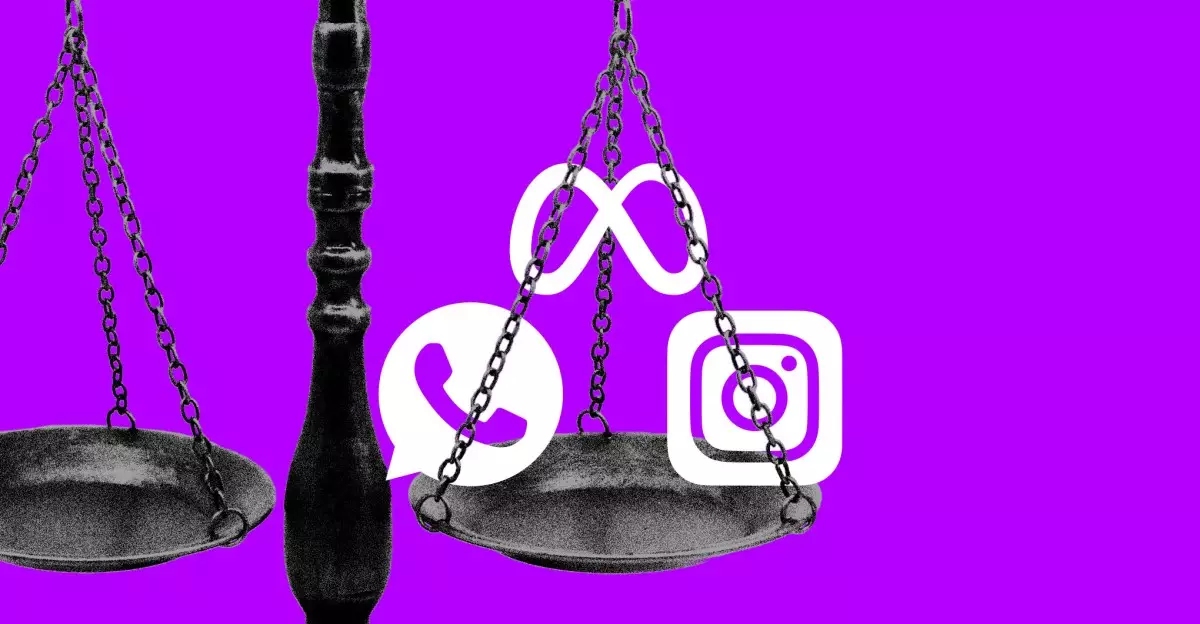In the ever-evolving landscape of technology, antitrust lawsuits have emerged as critical battlegrounds where companies, particularly giants like Meta, defend their acquisitions amid concerns of monopolistic behavior. The recent trial between the Federal Trade Commission (FTC) and Meta, involving CEO Mark Zuckerberg’s testimony, cast a spotlight on the controversial strategy of acquiring competitors. This trial, which began on April 14th, scrutinizes the rationale behind Zuckerberg’s 2014 acquisitions of WhatsApp and Instagram, as the government seeks to unravel what it contends is a calculated effort to suppress rival platforms.
Zuckerberg’s public persona has often oscillated between visionary leader and controversial figure, and during his testimony, he seemed determined to portray his acquisitions as proactive measures rather than aggressive maneuvers to crush competition. During cross-examination, his confidence was palpable. When asked about paying $19 billion for WhatsApp, he rejected the government’s narrative. “I’d do it again,” he stated with a conviction that not only underscored his belief in the strategic value of the investment but also hinted at his reluctance to concede ground to regulatory scrutiny.
Understanding the Strategic Mindset
At the heart of the testimony lies a fundamental clash of narratives. The FTC argues that Zuckerberg’s purchase of WhatsApp and Instagram was rooted in fear—fear of competition and fear of losing control in a rapidly transforming digital landscape. The agency posits that rather than fostering innovation and user choice, the acquisitions were intended to smother potential threats. Zuckerberg’s perspective diverges sharply from this viewpoint. He characterizes WhatsApp’s acquisition as a response to a burgeoning shift toward private communications, signaling a transformation in user behavior that demanded Facebook’s strategic adaptation.
This shift towards private messaging was pivotal for Zuckerberg, who viewed WhatsApp not merely as an app but as a passport into the future of social interaction. He contended that, upon meeting WhatsApp co-founders Jan Koum and Brian Acton, he sensed their “unambitious” outlook regarding the scale of growth and market expansion. In his eyes, acquiring WhatsApp presented an opportunity, not a threat, allowing Facebook to enhance its portfolio and evolve with changing user preferences.
Striking a Balance: Growth vs. Control
A significant narrative thread woven through Zuckerberg’s testimony is his nuanced stance on competition and control. While the FTC suggests that his acquisition strategies were cloaked in a desire to “neutralize” competitors, Zuckerberg painted a picture of collaboration and resource allocation. He acknowledged that in the initial stages post-acquisition, the commitment to grow both WhatsApp and Instagram was about empowering these platforms to leverage Facebook’s resources for sustainable scaling.
Internal documents revealed in the proceedings highlighted a projected roadmap showcasing ambitious user growth for WhatsApp—a prediction that vastly underestimated reality, as the platform now nears 3 billion users. The success of both platforms serves as evidence that Zuckerberg’s approach was not one of suppression but rather one of significant investment leading to exponential growth. Supporting his narrative, Zuckerberg expressed how his strategic decisions often influenced the lifecycle of these applications, providing necessary tools and support to combat spam and reinforce operational robustness.
The Rebellious Co-founders: A Tale of Diverging Visions
Despite Zuckerberg’s claims of fostering innovation, the dynamics with Instagram’s initial co-founders, Kevin Systrom and Mike Krieger, revealed complex layers of discontent. Incorporating changes and directing the Instagram team to pivot away from direct integrations with Facebook hinted at underlying tensions. The eventual exit of Systrom and Krieger shortly after the acquisition underscores a reality that even successful acquisitions are fraught with challenges. Their departure suggests that the autonomy and original vision of acquired entities can sometimes clash with the strategic goals of their parent company.
Zuckerberg painted an idealistic image of collaboration, but the narrative raises questions regarding how far he values the founders’ visions of their platforms. His insistence that Instagram required Facebook’s robust infrastructure to thrive plays into the narrative of necessity in acquisitions, yet it also reflects an ambiguous relationship where founders either adapt to the new overlords or risk being ostracized.
Perspectives on Value Creation
Through strategic acquisitions such as WhatsApp and Instagram, Zuckerberg aimed to solidify Meta’s position in the market, navigating competitive pressures from tech giants like Apple and Google. While acknowledging the challenges of working with these colossal platform orchestrators, Zuckerberg outlined how ownership of these applications enhances Meta’s bargaining position. His assertion emphasizes a broader conversation about the nature of power in technology—whether it fosters innovation or stifles it through expansive control.
As perceptions around data privacy, user rights, and ethical considerations grow louder, Zuckerberg’s unapologetic stance during the trial raises critical questions. Is his conviction in acquisitions a testament to visionary leadership, or does it exemplify a monopolistic mindset that the FTC aims to dismantle? The antitrust suit against Meta serves as a pivotal moment, one that might reshape the narrative of innovation, control, and competition, compelling tech leaders and policymakers to reconsider the ethical frameworks surrounding digital acquisitions and user trust.

